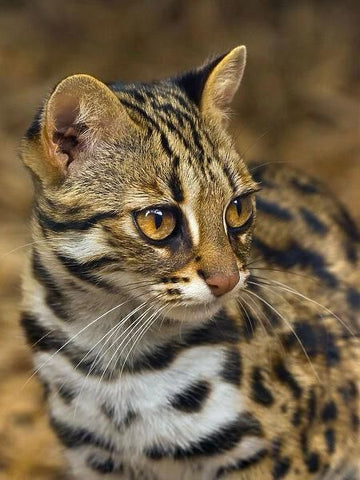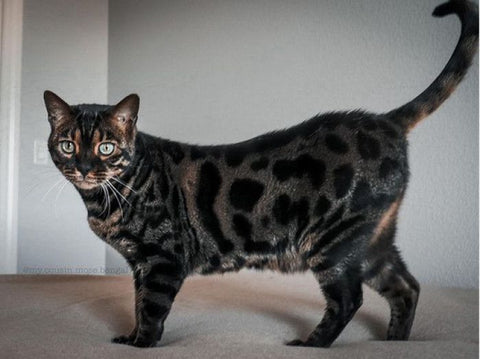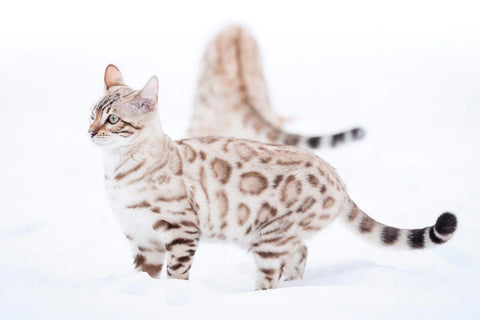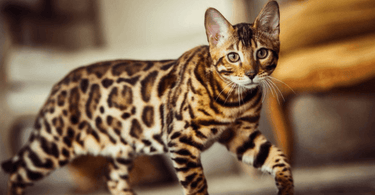By Tippaws' in-house cat behaviourist and Bengal owner Francesca Lees, (Hons) NCert ( AnBeh) ISFM CertFN RVN
Bengal cats are captivating creatures that combine the exotic allure of a wild feline with the affectionate companionship of a domestic cat. If you're considering bringing one into your home, it's essential to understand their unique characteristics and care requirements. Let's take a closer look at what makes Bengal cats so special and share some Bengal cat facts.
Origins: the history of the Bengal, a relatively new breed
Bengal cats originated from the breeding of Asian leopard cats with domestic cats in the 1960s, aiming for a wild appearance. They are known as a wild cat hybrid breed. Original F1 (first generation) Bengal cats are very wild like as they are 50% Asian Leopard cat and 50% domestic cat, however as they breed this dilutes down and so the further down the generation the less “wild” they will be. The levels continue to F2, F3, F4 etc. For example a F5 Bengal is going to exhibit much less wild behaviours than a F1 Bengal. A F5 may also be smaller and have less prominent leopard spots than a F1 Bengal.

The Bengal breed gets its name from the species name bengalensis, not from the Bengal tiger as some people might think.
Appearance: leopard-like
Bengal cats are medium to large-sized felines known for their distinctive spotted or marbled coats. The Bengal cat's sleek, short fur comes in a variety of colours, typically spotted in brown, but also in silver, snow, blue, and charcoal. One of their most striking features is their large, expressive eyes, which are typically green or gold.


Often Bengals are put in the same appearance category as Egyptian Mau cats and Abyssinian cats.
Bengal cat breed personality and temperament
Energetic and playful, Bengals are known for their love of climbing and jumping which some owners can find challenging! They require regular play and benefit from playing predatory type hunting games such as chasing a fishing rod type toy. Playing with your Bengal every day can reduce boredom and aggressive predatory play towards humans. No-one wants a bored Bengal!
Intelligent and curious, they enjoy interactive play and mental stimulation. They tend to try and be involved in everything and often don’t leave their owners alone! Sometimes this means they like to wake you up in the night and owners of Bengals often report they like water and will try and get in baths!
Bengals can form strong bonds with their owners and may exhibit dog-like behaviours such as following owners around and being very vocal. They can be prone to separation anxiety related issues.
Care and Maintenance: grooming, exercise and diet
Fortunately, Bengal cats require minimal grooming compared to other cats such as a tabby thanks to their short coats. However, they do need regular exercise and mental stimulation to keep them happy and healthy as they get bored quickly. They are quite muscular and can benefit greatly from using a cat running wheel, a catio exercise area, cat shelving on the walls to jump up onto and run along and can be harness and lead trained to go on adventures!
While generally healthy, like every cat, Bengals may be prone to certain genetic conditions like hypertrophic cardiomyopathy or progressive retinal atrophy.
Bengals generally do well on both wet or dry food or a mix. Some Bengals can have sensitive stomachs and so a sensitivity diet or hypoallergenic diet may help. Generally Bengals can be fed on a dry, complete food with a high protein content. If in doubt about cat food, always check with a veterinary or feline nutrition professional.
Bengal cat habitat
Bengal cats adapt well to indoor living but may benefit from access to safe outdoor spaces such as a catio or an enclosed cat fenced garden. Many people have Bengals as indoor cats as due to their striking markings they can be prone to theft. They are also avid hunters and are very good at catching birds and small mammals which some owners do not want and so keep them indoors.
They enjoy high perches and hiding spots, reflecting their wildcat heritage and benefit greatly from having cat shelving installed within the home. Indoor Bengals need a lot of enrichment so lots of food puzzles are great for them.
Bengal fun facts
- Bengals love water!
- They are great at learning tricks
- Bengals are great jumpers!
Popularity, an increase in breeders and Bengals up for adoption
With their striking appearance and active personalities, Bengal cats have gained popularity among cat enthusiasts worldwide. Many Bengals even have their own social media accounts, boasting thousands of followers. The breed is recognised by various cat breed registries and international cat associations, including the GCCF (Governing Council of the Cat Fancy), TICA and CFA which hold shows where cats can enter into competitions to win rosettes and other prizes.
The Bengal's popularity has resulted in an increase in breeders over the years with it being the fastest growing cat breed in the 1990s. However, if you are looking to get a Bengal cat or kitten as a pet, we strongly advise you contact cat rescues first. Due to their unique personalities, a lot of owners realise Bengals may not be the right cat for them and end up putting them up for adoption.
Suitability as Pets
Although Bengals are striking to look at and a fun breed they would suit a more experienced cat owner best. Their need for attention, their closely linked wild ancestry, their agility, love of climbing and hunting make them a breed which requires a good knowledge of cat behaviour (and a willingness to be adaptable and open to their specific needs). A novice cat owner would be more suited to a calmer breed. As they are a confident and strong willed breed they are generally good with older children and are quite happy to live with dogs so do make a great family pet with the right owners who can embrace their individuality and keep them entertained.
In conclusion, Bengals are unique and loving cats, and understanding their physical characteristics, personality traits, and care requirements will help ensure they are the right cat for you and most importantly, they are happy.
If you'd like advice on owning a Bengal cat, please contact Francesca through the contact form on her website.


A Bengal cat is on my wishlist. However there are 2 additional pets I want as well. I want a Husky, and a large parrot. Either an African Grey, or an Umbrella Cockatoo. Can this combination of pets successfully coexist given the Bengal’s natural predatory instinct? If so, what is the order in which I should introduce each pet into my family?
Hi Sarah
Yes bengals can be left in catteries but would need lots of attention and toys and stimulation so choose your cattery wisely. Try to find one who have experience with Bengals. Some may have cat running wheels and cattery workers who come in and regularly spend time fussing the cats would be beneficial. I would try and find a cat sitter who comes to your home and looks after your cats in their own home if you can but if you can’t then a cattery is second best and they would at least be safe there
If you need anymore help with your bengal please contact me at Wild Cats Feline Behaviour
Can they stay in a cattery whilst on holiday or would it be too strenuous for them?
I owned 2 F4 Bengals 35 years ago and they were the smartest most talkative and beautiful cats I ever owned over the many breeds I did own
You must engage with them, they will not be ignored. But they will steal your hearts. Imagine every day
They lived for 16 years.
I am on my 2nd Bengal and loving it!